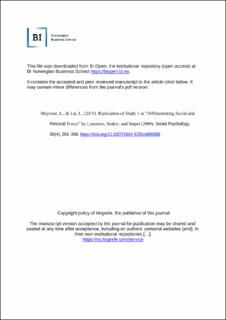| dc.contributor.author | Mayiwar, Lewend | |
| dc.contributor.author | Lai, Linda | |
| dc.date.accessioned | 2020-11-20T17:16:57Z | |
| dc.date.available | 2020-11-20T17:16:57Z | |
| dc.date.created | 2019-10-03T18:12:33Z | |
| dc.date.issued | 2019 | |
| dc.identifier.citation | Social Psychology. 2019, 50 (4), 261-269. | en_US |
| dc.identifier.issn | 1864-9335 | |
| dc.identifier.uri | https://hdl.handle.net/11250/2688951 | |
| dc.description.abstract | We performed an independent, direct, and better powered (N = 295) replication of Study 1, an experiment (N = 113) by Lammers, Stoker, and Stapel (2009). Lammers and colleagues distinguished between social power (influence over others) and personal power (freedom from the influence of others), and found support for their predictions that the two forms of power produce opposite effects on stereotyping, but parallel effects on behavioral approach. Our results did not replicate the effects on behavioral approach, but partially replicated the effects on stereotyping. Compared to personal power, social power produced less stereotyping, but neither form of power differed significantly from the control condition, and effect sizes were considerably lower than the original estimates. Potential explanations are discussed. | en_US |
| dc.language.iso | eng | en_US |
| dc.publisher | Hogrefe | en_US |
| dc.title | Replication of Study 1 in "Differentiating Social and Personal Power" by Lammers, Stoker, and Stapel (2009) | en_US |
| dc.type | Journal article | en_US |
| dc.type | Peer reviewed | en_US |
| dc.description.version | acceptedVersion | en_US |
| dc.source.pagenumber | 261-269 | en_US |
| dc.source.volume | 50 | en_US |
| dc.source.journal | Social Psychology | en_US |
| dc.source.issue | 4 | en_US |
| dc.identifier.doi | 10.1027/1864-9335/a000388 | |
| dc.identifier.cristin | 1733719 | |
| cristin.unitcode | 158,4,0,0 | |
| cristin.unitname | Institutt for ledelse og organisasjon | |
| cristin.ispublished | true | |
| cristin.fulltext | postprint | |
| cristin.qualitycode | 1 | |
